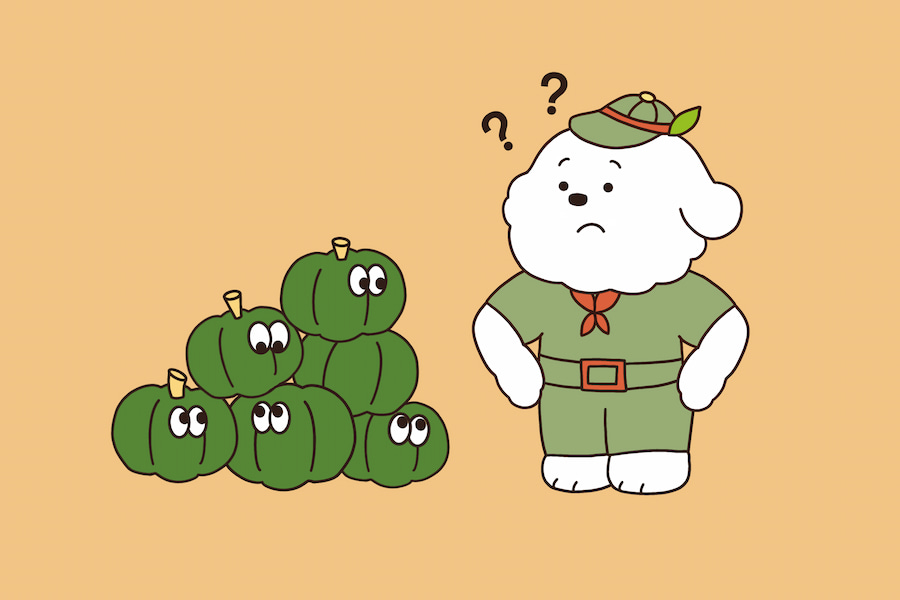Since pineapple is a popular tropical fruit in many homes, our four-legged companions have formerly come across it in one of its various forms, including fresh, frozen, dried, or even grilled. But can dogs eat pineapple? Is it okay for our furry friends to eat this popular fruit? To find out, continue reading.

We continuously research recipes to make the best treats for dog’s health by combining pineapple with dried pollock, with the bones and salt removed!
Can Dogs Have Pineapple?
Yes, pineapple is safe for dogs to eat. Vitamin C and the B-complex vitamins are abundant in fresh pineapple. High concentrations of minerals and electrolytes, such as magnesium, zinc, potassium, and iron, are also present. Pineapple has a lot of nutrients that are beneficial for your dog’s digestive and immune systems.
Is Pineapple Safe for Dogs?
The short answer is yes. When consumed in small amounts, raw pineapple makes an excellent snack for dogs. On the other hand, canned pineapple must be avoided. Most dogs’ digestive systems cannot tolerate the amount of sugar in fruit syrup found in canned goods. For most canines, a few chunks of raw pineapple, chopped into bite-sized pieces after peeling, should be sufficient. In addition, frozen chunks of fresh pineapple are a great summertime treat.
We eat various types of pineapples, from pineapple pizza to frozen, freeze-dried, and juice. Now, let’s find the answer to “Can dogs eat these types of pineapples?”.
Can I Give My Dog Canned Pineapple?
Canned pineapple is not toxic for dogs, just like fresh pineapple. Nonetheless, compared to fresh pineapple, canned pineapple often contains more sugar. The syrup or fruit juice the canned pineapple is sitting in is mostly to blame. Sugar-rich diets can lead to weight gain and the development of medical disorders such as diabetes in dogs. Likewise, sugar-rich diets can lead to oral problems like gingivitis and plaque accumulation.
Can Dogs Have Cooked Pineapple?
Cooked pineapple is safe for dogs, but only in small amounts. Although cooking can lower the vitamin value, the fruit is still nutritious. Make sure no additional flavors or sweeteners are added while cooking.

Compared to raw pineapple, cooked pineapple may be softer and simpler for certain dogs to digest.
Can Dogs Eat Frozen Pineapple?
Yes, dogs can consume frozen pineapple. In hot weather, frozen pineapple chunks can be a refreshing treat. They can also aid in easing a puppy’s teething discomfort. Serve the fruit in moderation because of the high sugar content.

Also, make sure the pieces are small enough to avoid choking hazards.
Can Dogs Have Pineapple Juice?
Pineapple juice is not the ideal option, although dogs can consume it in moderation. Pineapple juice frequently lacks the fiber in the entire fruit and is heavy in natural sugars. Overindulgence in sugar can result in health problems, including diabetes and obesity. If you decide to provide pineapple juice to your dog, make sure it’s fresh, unsweetened, and given in moderation.
Can Dogs Eat Dried Pineapple?
Yes, dogs can consume dried pineapple. To keep them healthy, make sure there are no additional sweets or preservatives.

Lee&Pol offers freeze-dried treats made from pure pineapple with no sugar, preservatives, or any other additives, ensuring a safe and healthy treat for your dog!
Is Pineapple Good for Dogs?
Pineapple is a healthy dog snack, just as it is for people. Iron, magnesium, potassium, and vitamin C are all found in pineapples and are critical to a dog’s health. Regularly adding pineapple to your pet’s diet is not required because these vitamins and nutrients are already included in most commercial dog diets. This delicious fruit can be saved for special occasions instead.
Benefits of Pineapple for Dogs
Benefits of pineapple for dogs include:
- Pineapple is an outstanding treat to keep the dog hydrated, especially on hot days, since it contains 82–86 percent water.
- Antioxidants found in pineapple help repair damaged cells.
- Vitamin C boosts your dog’s immune system, is an anti-inflammatory agent, lowers cholesterol, prevents heart disease, increases immunity against illnesses, and regenerates tissues.
- Vitamin B6 is necessary for body and brain functions. Among its many advantages are hormone regulation, heart health promotion, red blood cell production, and mood enhancement for dogs. For pups, vitamin B6 is particularly crucial during their growth period.
- The high fiber content of pineapple is beneficial to your dog’s digestive tract.
- Along with the minerals and vitamins listed above, pineapple contains trace amounts of calcium, phosphorous, and zinc, which are good for digestion and immune system support. These nutrients help give your dog a healthy, shiny coat and strong ligaments and tissues, as well as support their eyesight and help patella luxtation.
How Much Pineapple Can a Dog Eat?
Pineapple can be a tasty treat for dogs but should only make up 10% of their overall diet, with the remaining 90% coming from balanced dog food. Here are guidelines for feeding raw pineapple based on your dog’s weight. Ensure you remove the core and cut the pineapple into pieces about 1 inch x 1 inch x ¼-inch thick.
- Extra-small dogs (-20 lbs.): 1-2 pieces (e.g., Chihuahuas, Yorkies)
- Small dogs (21-30 lbs.): 2-3 pieces (e.g., Pugs, Beagles)
- Medium dogs (31-50 lbs.): 5-6 pieces (e.g., Border Collies, Basset Hounds)
- Large dogs (51-90 lbs.): A handful of pieces (e.g., Labradors, German Shepherds)
- Extra-large dogs (91+ lbs.): A large handful (e.g., St. Great Pyrenees, Bernards)

Dehydrated pineapple should be rehydrated or given in smaller amounts due to concentrated sugars.
The following are signs that your dog has eaten too much pineapple:
- Difficulty pooping
- Gassiness
- Diarrhea
- Upset stomach
- Vomiting
How Can I Feed Pineapple to My Dog?
Dogs can have pineapple as a treat or combined with their usual diet; however, before giving your dog pineapple, we advise you to consider the following:
Can Dogs Eat Pineapple Core?
No, dogs shouldn’t eat pineapple core. The hard, fibrous core is difficult for dogs to chew and digest. To keep your dog safe, remove the core and provide only the pineapple’s soft, fleshy bits in small chunks.

Pineapple cores can cause gastrointestinal difficulties, including obstructions, requiring surgery.
Can Dogs Eat Pineapple Skin?
No, dogs should not eat pineapple skin. The tough, fibrous texture can be difficult to digest and may cause gastrointestinal blockages. The spiky exterior also poses a choking hazard and may damage a dog’s digestive tract. It’s best to remove the skin and offer only the soft, fleshy part of the pineapple in small, manageable pieces.

We remove the core & skin of the pineapple and cut it into bite-sized pieces to make it easy for your dog to eat!
Can Dogs Eat Pink Pineapple?
The pineapple family recently expanded to include pink pineapples. The Del Monte firm genetically altered them to create rosy flesh.
Although “genetically modified food” can be frightening, most genetically modified foods are harmless. Scientists changed the enzyme determining a pineapple’s color as it grows to produce pink pineapples. The same pigment, lycopene, is responsible for the reddish color of watermelon and tomatoes.

Since both foods are suitable for dogs, your dog won’t be in danger, and pink pineapples still have all the health advantages of yellow pineapple.
Does Pineapple Stop Dogs from Eating Poop?
Giving dogs pineapple may help lower their chance of consuming stool, according to some research. This is because pineapples have an enzyme known as bromelain, which breaks down proteins and deters dogs from being attracted to dog feces.

It’s not a recognized treatment, but there’s no harm in trying. We advise exercising caution while consuming too much pineapple, which can have negative consequences.
Conclusion
Pineapple can be a delightful and healthful treat for dogs when given in moderation. Fresh pineapple benefits your dog’s digestion, immune system, skin, and coat by providing moisture, fiber, vitamins, minerals, and antioxidants. To avoid choking, it’s crucial to offer your dog only the little portions of the peeled, meaty section of the pineapple.
Pineapple in canned, dry, or juiced form should be avoided because of the added sugar. Try a small amount of pineapple first to ensure it doesn’t upset your dog’s tummy.
Pineapple is not a perfect remedy, but it might discourage poop-eating. Above all, to keep your dog’s diet balanced, treats like pineapple should not account for more than 10% of their daily caloric intake. If provided appropriately, your dog can enjoy this delightful tropical fruit as a treat occasionally.
FAQ
Yes, when fed in moderation, pineapples are indeed beneficial to dogs. They can help your dog’s immune and digestive systems because they are high in vitamins, minerals, and fiber. However, because of their high natural sugar content, they should only be given occasionally as a treat.
French Bulldogs, also known as Frenchies, can consume pineapple in moderation. Pineapple offers vitamins, minerals, and fiber that can be advantageous to their well-being. To ensure pineapple doesn’t upset their stomach, introduce it gradually and in moderate amounts, as Frenchies are prone to digestive problems. Before feeding, always remove the peel and core.
You can feed a dog a tiny bit of pineapple—two to three tiny chunks mixed in with their regular food—to help discourage them from eating dog stool. Bromelain, found in pineapples, can change the flavor of their stool, making it less appetizing. However, not all dogs respond well to this approach. Therefore, constant observation and training are also required.
Fresh pineapple isn’t too sweet for your dog to enjoy as a special treat if they don’t have diabetes or are overweight. Since pineapple is mostly composed of water (with 10% natural sugars), a few pieces here and there are not dangerous, especially since it also has a lot of nutrients that are good for dogs’ health.
Yes, puppies can eat pineapple in moderation. Growing puppies can get vitamins and minerals from pineapple. To avoid stomach discomfort, introduce pineapple gently and in modest amounts. Also, ensure the pineapple is fresh, peeled, and chopped into small, manageable pieces. Avoid offering pups canned or dry pineapple due to the high sugar content.



